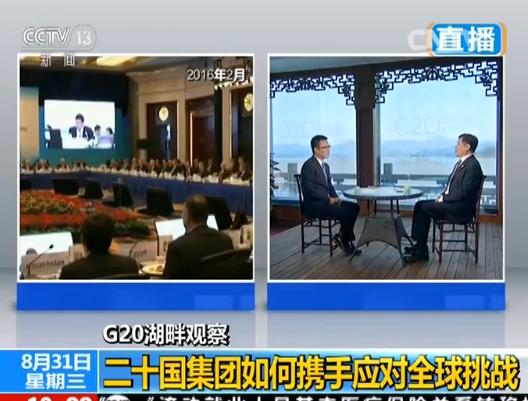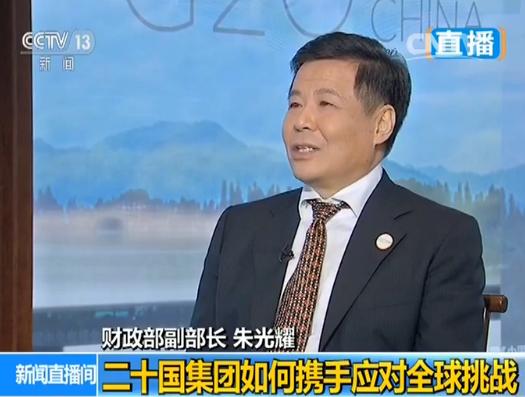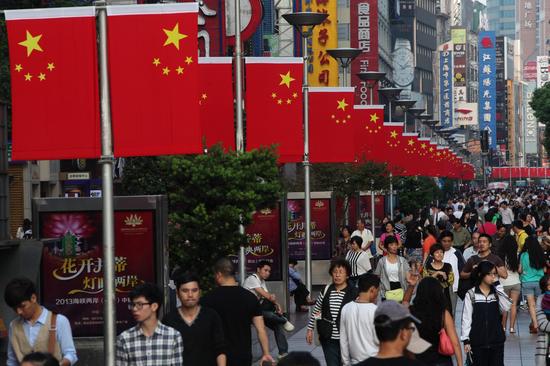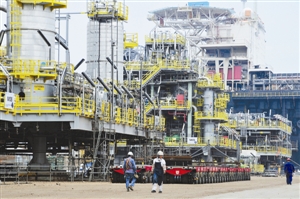CCTV News:Innovation is a very important topic in this G20 Summit. The international community expects the Hangzhou Summit to contribute to the sustainable and inclusive growth of the world economy. So how should the G20 join hands to meet the challenges of the global economy? CCTV interviewed Zhu Guangyao, Vice Minister of Finance.
The uncertainty of the current international economic situation has increased.

CCTV reporter Zhang Yu:One of the main purposes of the G20 Hangzhou Summit is to lead the healthy development of the international economy and strengthen the governance of international finance. What is the current international financial form? What’s the next step?
Vice Minister of Finance Zhu Guangyao:In the current international economic situation, we analyze it this way. Since the outbreak of the global financial crisis in September 2008, the whole world, especially the G20, has been committed to restoring global economic growth. Eight years have passed, and the G20 has held ten summits, all of which are expected to make the world economy embark on a strong, sustainable and balanced growth channel. We objectively evaluate that the world economy is in the process of recovery for eight years, but this recovery is very slow and unbalanced. And some new uncertainties are increasing.
G20 has achieved results in global economic governance.
The result of the Brexit referendum on June 23rd led to new uncertainties in the European economy and the global economy. Zhu Guangyao believes that in the past few years, the G20 has made achievements in strengthening global economic governance and financial supervision.
Zhu Guangyao, Vice Minister of FinanceBecause of such a big vibration, the financial market showed its resilience, so after a short-term oscillation, the world financial market returned to a basic stable state. Of course, the medium-and long-term impact of Brexit will continue to emerge, which is why the International Monetary Fund has lowered the growth rate of the global economy several times this year, from 3.6% predicted at the beginning of the year to 3.1% now.
The world expects China to provide growth momentum.
Zhu Guangyao believes that with the increasing global economic uncertainty and downward pressure on the global economy, the world has great expectations for the G20 Hangzhou Summit — — It is expected that the Hangzhou Summit will achieve the grand goal of building an innovative, dynamic, coordinated and inclusive world economy. This goal was put forward by China as the presidency in 2016, which shows China’s wisdom and meets the objective requirement that G20 countries and the world need new growth-driven power. Therefore, it is supported by all G20 member countries and welcomed by the world.
What is the biggest difficulty facing G20? Uncertainty of international economy
However, what are the biggest difficulties and challenges in the international economic situation facing the G20 Hangzhou Summit?
Zhu Guangyao believes that the answer is uncertainty.
Zhu Guangyao, Vice Minister of FinanceThis uncertainty is not only reflected in the differentiation of monetary policies in developed countries; On the other hand, some important emerging market economies are currently facing difficulties, such as Russia and Brazil; Global trade growth is lower than global economic growth … … These factors, coupled with geopolitical risks, constitute the uncertainty of the global economy.
The G20 plays a key role in stabilizing monetary policy.
CCTV reporter Zhang YuNot long ago, the Federal Reserve mentioned that the possibility of raising interest rates is increasing, so is it possible for the RMB to depreciate further as it raises interest rates?
Zhu Guangyao, Vice Minister of FinanceIn terms of exchange rate policy, it is true that G20 finance ministers and central bank governors had in-depth discussions. At the G20 finance ministers and central bank governors meeting held in Shanghai in February this year, two most important policy consensuses were reached, which will also be submitted to the G20 Summit in Hangzhou for approval. The first is to comprehensively use monetary policy, fiscal policy and structural reform policy to promote economic growth; The second policy consensus is about the exchange rate. On the basis of the original policy of G20 Summit, that is, opposing competitive currency devaluation and using exchange rate to gain trade advantages.

Zhu Guangyao said that this summit will propose for the first time that G20 member countries should strengthen policy communication on the foreign exchange market, so G20 plays an extremely important role in stabilizing the global financial market and keeping the global exchange rate market basically stable.
Will the Fed’s interest rate hike further devalue the RMB?
CCTV reporter Zhang YuG20 Summit Hangzhou Summit is likely to reach such a consensus — — The exchange rate remains relatively stable, that is to say, even if the United States raises interest rates, it is impossible for the RMB to depreciate significantly, right?
Zhu Guangyao, Vice Minister of FinanceThe exchange rate of RMB first depends on the economic fundamentals of China. When we judge the trend of China’s economy, the most basic understanding is that China’s economic fundamentals are good, China’s economy is resilient, and China’s economy has great room for development. Under this good economic growth prospect, the RMB does not have the basis for continuous depreciation in the long run, so we say so, and in the market, the overall judgment is the same.
IMF: Optimistic about China’s economic development prospects
Zhu Guangyao believes that the judgment of the International Monetary Fund and the World Bank on economic growth is particularly important, among which the core policy recommendations come from the International Monetary Fund, which is responsible for monitoring the stability of the global economy and financial markets. Ms Lagarde, the managing director of the International Monetary Fund, and the financial president of the World Bank are highly concerned about the economic growth of China, and at the same time they have made an objective evaluation of the economic development prospects of China.
CCTV reporter Zhang YuThere is also a very sensitive issue, that is, the issue of economic growth. Now the expectation of future international GDP growth rate has been lowered. Then, at the previous meeting of central banks and finance ministers, what kind of prediction did you have about the economic growth rate of the whole international economy, especially the new economies, and especially China?
Zhu Guangyao, Vice Minister of FinanceOn the whole, the International Monetary Fund believes that although the global economic growth rate is decreasing in 2016, the prospect of China’s economic development is promising. Therefore, he has lowered the global economic growth rate twice in a row and raised the growth rate of China’s economy. Now the IMF’s judgment on China’s global economic growth in 2016 is 6.6%. This is in line with the economic growth range of 6.5% to 7% in 2016 determined by the China Municipal Government. China’s economic growth rate in the first half of the year was 6.7%.
China’s economy is still in the three-phase superposition stage.

CCTV reporter Zhang YuIn fact, some people in China are worried or feel that the growth rate of 6.7% may be too high, and they feel that this speed is overestimated.
Zhu Guangyao, Vice Minister of FinanceWhether the actual growth rate of China’s economy is high or low may be different, but the statistical data must be realistic and truly, accurately and completely reflect the actual situation of China’s economic growth. From the figures published by the Bureau of Statistics, the primary industry, the secondary industry and the tertiary industry all have detailed figures to show that they constitute all aspects of economic growth. Only in this way can we make a complete, scientific and accurate judgment. So we think this figure is true and credible.
At the same time, Zhu Guangyao said that China’s economy is still under the challenge of three-phase superposition, facing the challenges of the adjustment period of economic growth, the analgesia period of economic structural reform and the digestion period of the previous large-scale economic stimulus plan.
Supply-side reform helps to achieve economic development goals.
As far as the adjustment period of economic growth is concerned, China has changed from a high growth rate of over 10% to a medium-high growth rate. During the 13th Five-Year Plan period, the average annual growth rate reached 6.5%.
Zhu Guangyao, Vice Minister of FinanceWe can certainly achieve this goal, because we have both good economic fundamentals and major measures to deepen reform, especially the deepening of supply-side structural reform, which will help us achieve this important development goal.
China adheres to the market principle in economic development.

CCTV reporter Zhang YuYou just talked about a very critical issue. The only way out for us to face the challenge is reform. So are there any major reform measures and specific planning schedules in the future?
Zhu Guangyao, Vice Minister of FinancePromoting reform and opening up is the unshakable policy goal of the central government. At the end of last year, the Central Economic Work Conference set a general tone for the economic development in 2016 — — It means persisting in reform and opening up and striving for progress while maintaining stability. General Secretary of the Supreme Leader repeatedly stressed that there should be major reform measures to enhance people’s confidence in the expectation of economic development in the future. Promote the structural reform of the supply side, de-capacity, de-inventory, de-leverage, reduce costs, and make up for shortcomings … … We are the first to advance in the world. Especially in dealing with excess capacity and high debt ratio, we take the lead in taking action among the major economies in the world; As far as de-capacity is concerned, we unswervingly adopt market principles and adhere to the rule of law. It has been made clear that in the process of de-capacity, mergers and acquisitions should be adopted, which is the principle of the market.
At the same time, it is necessary to use legal means, including bankruptcy reorganization, reconciliation and liquidation, and gradually promote the rule of law to remove production capacity by law. Therefore, the promotion of supply-side structural reform not only plays an extremely important role in the long-term economic development of China, but also plays an important role in the short-term economic growth. From the perspective of expectation, the market can feel that China is unswervingly pushing forward the reform, especially the structural reform on the supply side.
G20 central banks and finance ministers will put forward nine suggestions for the summit.
CCTV reporter Zhang YuSome time ago, six related ministerial meetings, including finance ministers, central bank governors and so on, were held, which basically covered the topics that might be involved in the G20 Hangzhou Summit. So, which of these phased results may eventually be reflected in the outcome of the G20 summit?
Zhu Guangyao, Vice Minister of FinanceThe report submitted to the summit by the G20 meeting of finance ministers and central bank governors is expected to be approved by the leaders in nine key areas and 48 major guiding principles of structural reform. These nine major areas first include building an open world investment and trade system. The second is to build a dynamic labor market; The third is to promote the implementation of innovation policies; The fourth is the competition policy, which includes improving the business environment; The fifth is to promote the linkage of global infrastructure; The sixth is to establish a perfect global financial system and domestic financial system; The seventh is to promote the reform of the financial system; The eighth is to promote sustainable growth, especially in the environmental field; The ninth major area is an inclusive growth, which can take special care of amblyopia groups and the development of small and medium-sized enterprises. These are the nine major areas.
It is expected that under the auspices of the Chairman of the Supreme Leader, the Hangzhou G20 Summit will leave a great contribution of China in the history of G20, leaving the mark of China. And promote strong, sustainable and balanced growth of the global economy.